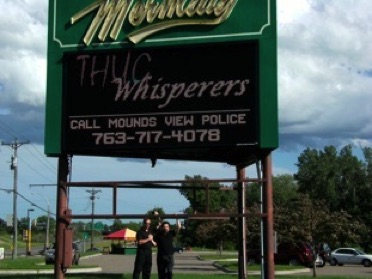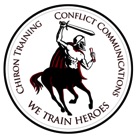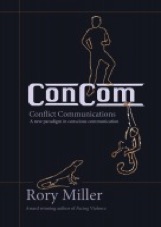To Book a Conflict Communication seminar, contact:
Marc MacYoung, program co-designer (Based in Colorado)
Rory Miller, program co-designer (Based in the Pacific NorthWest)
Tammy Yard-McCracken, Psy.D. Certified Instructor, (Based in VA)
Thomas Milbradt (KonKom Deutschland) 🇩🇪
Jon Bullock Certified Instructor, UK 🇬🇧
Randy King Certified Instructor Edmonton, AB, Canada🇨🇦
Dan-Philipp Trailescu Certified Instructor, Cypress🇨🇾 and Scotland
Beverly Baker Certified Instructor (Based in Southern California)
Boe Larsen Certified Instructor, Denmark 🇩🇰
Debra Criss, Certified Instructor (Based in Oregon)
The Thug Whisperer logo still tickles me...and if you aren’t laughing occasionally, you’re doing things wrong.
A former thug, a former Corrections Officer. Over sixty years of combined experience with bad people and situations...and both with the tendency to sit back after a situation and wonder why something worked or why it didn’t. Then the curiosity (and confidence in CQ) to try out new things. Yeah, coming up with something special was inevitable.
GENESIS
Once upon a time, Marc “Animal” MacYoung was teaching de-escalation for police officers in Germany. When he got home, he called me, “I just realized that about half of what I was teaching was coming out of Meditations on Violence. Interested in putting together a communications course for officers?”
I’d just finished the first draft of “7” (which was released in May 2011 under the title “Facing Violence”.) The section on Violence Dynamics presents a way to look at conflict that is orders of magnitude better than in Meditations. Yeah. “I’m in.”
So we got to work...and it is something special. Maybe universal. We were originally thinking about cops-- why situations go bad, when is it predictable, when the officer can change things...
We found a lot more. Have the same argument with your wife or husband every two weeks like clockwork? We found out why, and it may not even be bad. Are you a good operator who gets called into the lieutenant’s office more than the worthless or lazy? The dynamic has nothing to do with making others look bad or professional jealousy. Try to help administrators when they ask for help and get chewed out, ignored or punished? That’s what happens when you cross cultural boundaries and don’t realize it.
Not only is this program looking pretty cool (as in it took me over fifteen years to learn this by trial and error and we can teach the basics in a day) but it is looking universal as well.
Conflict Communications-- it’s not just for cops.
WHAT MAKES CONCOM DIFFERENT?
I’ve been through a lot of de-escalation training. Most of it was very good most of the time, and then would have occasional catastrophic failures. In some cases, it worked for certain officers and failed utterly for others.
Marc and I have both played at high-stakes, where the choice was between talking people down and taking them down. Completely aside from the paperwork, fighting gets people hurt. Sometimes me. If it needs to go there, I’ll go fast and hard. But if it doesn’t...
•We know that not everything can be talked down
•We know that not all conflict comes from the same motivation
•We know that the tactics a clinical psychologist uses in his office will not apply to an EDP in crisis in the street-- and we know why and what tactics might work
•We know that it is unreasonable to believe that there is always a reasonable solution
•We know that if someone’s definition of a ‘win’ includes seeing you bleeding and humiliated, there is no win-win
•We know the differences between an indignant citizen, a panicked mental, a professional criminal, a hustler and a predator who enjoys creating victims
• We don’t pretend that the same tactics will work on all those groups
•We know that even if you can’t always control the threat there is one factor you can control: yourself
“If talking is going to get you killed, it’s time to stop talking.”- RM
Conflict Communications is flexible. It gives you a paradigm to see what you are facing, tools to de-escalate, enough understanding to improvise on the fly AND better options for articulating what happened and why.
It is not a collection of tricks. It is a way to see and evaluate.




Paper Back on Amazon
(Available for Kindle, too)
E-Book on SmashWords
(multiple formats)
Just for the record, I get a small percentage when you go through these links and buy stuff on Amazon. Other venues, like Smashwords, I still get royalties, but no commission.



